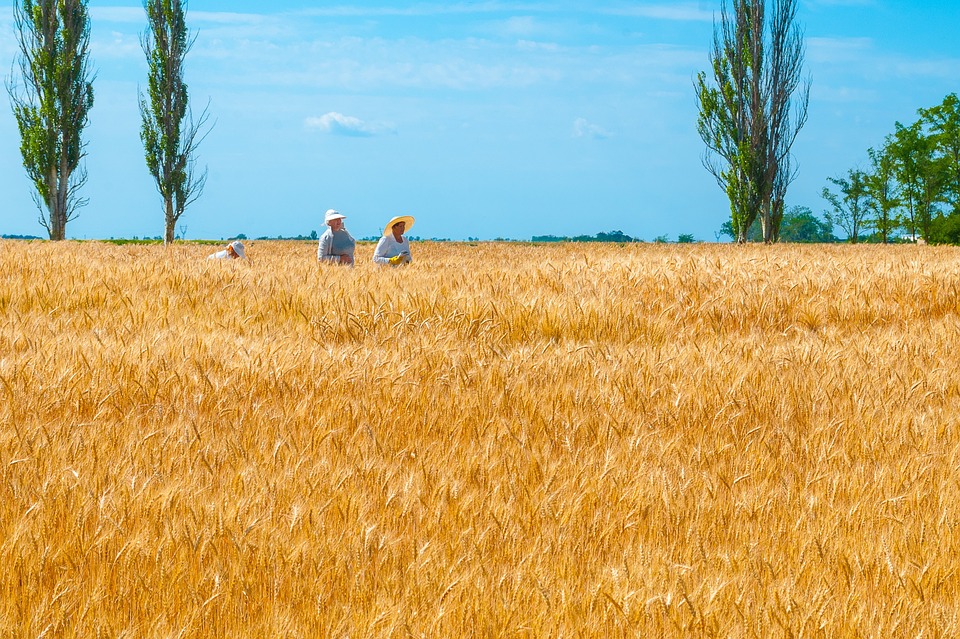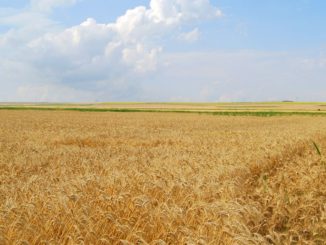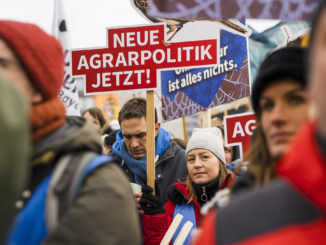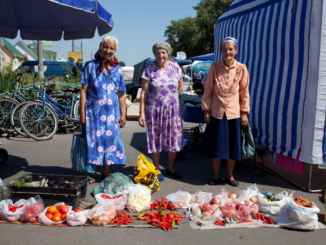Ukraine’s is in the news again after the Dutch vote against a free trade agreement between the EU and that state. But what do we know about its agricultural sector? Well, its booming. However, questions are being raised as to whom this new agrarian growth is actually benefiting; the rural population or established farming corporations?

Background
When President Poroschenko and Premier Yatsenyuk officially took charge of Ukraine’s government in 2014, they vowed to reform the country’s political system and promised a new era of economic prosperity for Ukraine. The government’s plan envisioned a new political course based on tighter economic cooperation with the EU and US. Therefore, when Ukraine’s leaders signed the Association Agreement with the EU in the same year, they were very hopeful for fast results from reform, new trading opportunities, and subsequently rapid economic growth.
However, the actual progress made in terms of Ukraine’s economic development and structural change has been disappointingly slow. The latest estimate from the World Bank shows that Ukraine’s GDP contracted by 12% in 2015, the level of inflation reached a suffocating 44%, and the country has experienced a dramatic fall in standards of living. However, there’s one particular sector that seems to take exception to the overall negative economic development of the country. And that is Ukraine’s agricultural sector.
New economic opportunities
Ukraine’s agriculture is growing fast. Last year, the country sold agricultural products for an aggregate value of 14,6 billion Dollars, reaching a record share of 34,7% in Ukraine’s total volume of exports. The outlook for the years to come is even more promising: Ukraine’s Minister of Agriculture Oleksiy Pavlenko announced that by 2020, the country’s output of grain is set to double as compared to 2015, and will reach a total production volume of 100 million tons of grain per year.
The rapid growth of agricultural output has been further accelerated by the increase of foreign investments in Ukrainian agriculture. Ukraine’s agrarian economy received close to 1 billion Euros in investments from 60 countries in 2015, a volume that is set to double in the current year. It has obtained almost 200 million Dollars in agricultural funds from the International Finance Corporation (IFC) since 2010. Furthermore, Ukraine’s Minister of Agriculture stated that Ukraine was presently working on broadening its bilateral relations with China, Korea, India, the United Arab Emirates and Iran in the area of agriculture.
Corporate international conglomerates are also optimistic for Ukraine to experience a new golden age of agriculture, and are pledging to invest large sums of money into Ukraine’s farming business. Cargill for example recently announced an investment of 100 million Dollars to build a new port in Yuzhny, allowing farmers to export an extra 5 million tons of grain every year.
The United State’s Ambassador to Ukraine Geoffrey R. Pyatt recently summarised the current developments in Ukraine’s agricultural sector as follows: “Ukraine is already one of the world’s great agricultural producers, but it should be an agricultural superpower”. His words probably best reflect the mixture of enthusiasm surrounding the fast-paced growth of the agrarian economy in Ukraine, and a certain level of cautiousness, hinting at many challenges remaining in the country’s farming sector.
Corruption and clientelism
A recent inquiry conducted by the American Chamber of Commerce in Ukraine found that 75% of surveyed entrepreneurs identified corruption as the key impediment to Ukraine’s sustainable economic development, followed by its unstable legal system and over-inflated bureaucracy.
The Ukrainian agricultural sector is no exception to that. According to a report from the Institute for Economics and Forecasting based in Kiev (NAS), most of the revenue from Ukraine’s new agro-economic growth is made by industrial farming corporations. Wealthy businessmen commonly referred to as “oligarchs” are often able to influence legislators and local authorities in order obtain investments and optimise taxes. Conversely, the economic opportunities for small-scale or “peasant farmers” are very limited.
The socio-economic impact of peasant farming in Ukraine is immense. Every fifth Ukrainian works in agriculture. Local farming is the backbone of Ukrainian rural society. Nonetheless, peasant farmers are nowadays all too often excluded from the overall economic structure and can only produce for subsistence purposes. Small and medium sized farmers are purposefully excluded from market structures, financing, fiscal advantages and subsidies. The access to finance for Ukraine’s SME farmers is often impossible or highly disadvantageous, as interest rates for farming activities reach as high as 35%. However, there is an even more essential commodity to which peasant farmers are gradually losing access to – their own land.
Land grabbing
Ukraine is experiencing an equivalent phenomenon to what is known as “land grabbing”, or the acquisition of large strips of land by financially strong agricultural corporations, a topic on which ARC2020 has reported on extensively. The situation is slightly different in the case of Ukraine: Its government has for many decades maintained a moratorium on the sale of rural terrain to secure the access to land for small farmers. Nevertheless, investors have found new mechanisms to circumvent this particular law, by signing long-term leases with peasant farmers (with sometimes up to 50 years of duration), and thereby to control large portions of land.
An example for Ukraine’s “quiet land grab” is Europe’s largest poultry farm, which is being built in the region of Vinnytsia in central Ukraine. The owner of this factory is Yuriy Kosiuk, one of Ukraine’s wealthiest businessmen. In order to expand his chicken farming operations, Mr. Kosiuk reportedly persuaded local farmers to hand over their land by signing long-term leases, whilst disregarding many environmental and social concerns raised by local citizens.
How socially cohesive is Ukraine’s new agricultural growth?
With the political revolution and subsequent change of government in Kiev, many Ukrainians hoped that their country had a historic opportunity to make society fairer, and economic opportunity more accessible to all of its citizens.
However, the newly found capital inflow into agriculture is likely acting as a catalyst for Ukraine’s recurrent problems, such as corruption and clientelism, and could further widen the income gap in the country’s two-speed rural economy. Ukraine has often been referred to as the breadbasket of Europe. However, with only a few powerful economic actors sharing almost all of the revenue, Ukraine is more likely to become a “breadbasket for oligarchs”.
The decline or disappearance of small and medium sized farmers from rural landscapes in Ukraine could be the starting point to a form of rural exodus. The consequence of mass migration to the cities is often a depletion of the rural resources and infrastructure, and could further accentuate Ukraine’s problems with rural poverty.





